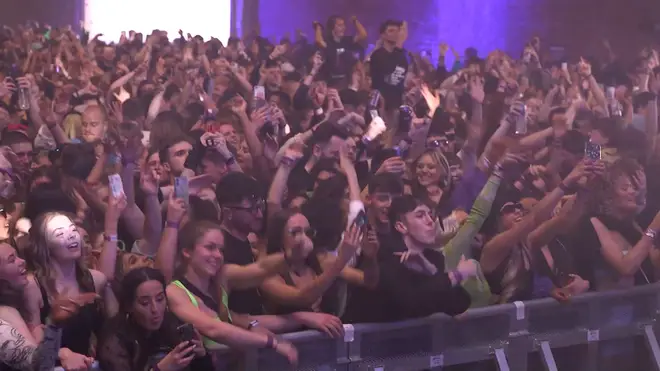
Shelagh Fogarty 1pm - 4pm
28 May 2021, 06:02 | Updated: 28 May 2021, 06:03

Indoor music events can go ahead without increasing the risk of Covid-19 spreading, studies have suggested.
Data taken from a trial concert in Spain shows no cases of coronavirus transmitting between guests, despite a lack of social distancing.
Attendees also sang – which has been considered a risk for spreading the virus – but had to take a rapid lateral flow test on the same day and wear N95 masks, while the venue had enhanced ventilation and crowd control measures.
The study in Barcelona, the first randomised controlled trial to assess Covid safety measures at an indoor gig, was carried out on December 12, ahead of the UK's recent large event experiments.
Infections in the region were low to intermediate at 221 cases per 100,000, so the number of new cases emerging from the event were expected to be low.
Read more: Thousands to pack Liverpool nightclub as part of coronavirus mass gatherings pilot
Read more: Culture Sec warns mass events could be off 'for many years' if they don't return in June
Dr Josep Llibre, the study's lead author, of the Germans Trias i Pujol University Hospital in Spain, said: "Our study provides early evidence that indoor music events can take place without raising the risk of SARS-CoV-2 transmission when comprehensive safety measures are in place, but it is important that our findings are considered in light of the situation in Spain at the time - when cases were not high and many restrictions were in place.

Revellers left with 'goosebumps' after Covid pilot event at Liverpool nightclub
"As a result, our study does not necessarily mean that all mass events are safe."
However, Dr Llibre added that the arrival of vaccines and emergence of variants could make a difference on the safety measures that were tested.
More studies are needed, he said.
The UK has carried out its own tests, as part of the Government's Events Research programme.
It tested large gatherings at sport and music events, and data from those studies will be used to assess how big crowds can be safely reintroduced from the summer.
Read more: PM faces growing criticism after backing 'vaccine passports' for mass events
Read more: Leicester City take home FA Cup in front of 21,000 football fans at Wembley
Thousands went into a club after taking a lateral flow test - but no social distancing or masks were required.
Across 60,000 who attended events including the FA Cup final, the Brit Awards and the Snooker World Championship in Sheffield, just 15 people tested positive for Covid, according to reports.
Another study published in The Lancet Infectious Diseases journal looked at using mass testing and other safety measures to make events safer.

Festival organiser briefs LBC on mass event pilots
These included serving drinks to attendees in a separate room, a smoking area with controlled capacity and distancing, and the use of a contact tracing app and a separate app to receive test results.
The test event lasted about five hours. None of the people who went tested positive eight days after, while two people from the study's control group did.
However, researchers noted the safety measures posed practical problems because they could be too expensive for venues, and testing thousands in the hours before a major event creates logistical issues.
They also said the guests may have modified their behaviour because they were aware they were being observed, though all said they behaved normally.